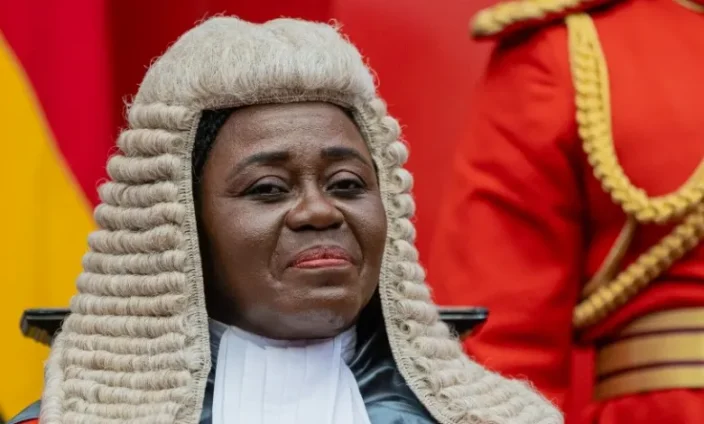Justice Amoako rules application as abuse of process and beyond court’s jurisdiction
By Alex Ababio
The Human Rights Division of the High Court in Accra has rejected a judicial review application filed by suspended Chief Justice Gertrude Torkornoo, describing it as an abuse of the court process and asserting that the court lacked the jurisdiction to entertain the matter.
The decision, delivered by Justice Kwame Amoako, marks the second failed attempt by the Chief Justice to legally challenge the ongoing impeachment proceedings against her, initiated under Article 146 of the 1992 Constitution.
Background to the Review
The judicial review application, filed on June 9, 2025, sought nine distinct reliefs. Chief among them was a call to annul the proceedings of the committee investigating her conduct, alleging that the committee was operating unlawfully.
Torkornoo argued that she had not been served with authenticated copies of the petitions and responses against her, and that the committee’s procedures were tainted by breaches of fair hearing and due process.
This attempt followed a prior case she filed at the Supreme Court, seeking constitutional interpretation, and a separate request for an injunction to halt the impeachment process—both of which were unsuccessful.
Two Categories of Dismissal
Justice Amoako grouped the reliefs into two broad categories:
1. Claims Dismissed as Abuse of Court Process
2. Claims Dismissed for Lack of Jurisdiction
1. Claims Dismissed as Abuse of Court Process
The High Court dismissed several of the Chief Justice’s claims on grounds that they overlapped with issues currently pending before the Supreme Court.
These included:
Allegations that the committee’s proceedings were unlawful due to the Judicial Service Registry’s failure to provide authenticated petition documents and responses.
A request to stop the committee from sitting until such authenticated documents were made available.
Accusations that the committee was conducting adversarial, rather than neutral, inquiries.
Allegations of an unlawfully constituted committee.
Justice Amoako held that bringing these issues before the High Court while they are being actively considered by the Supreme Court amounted to duplicative litigation and constituted an abuse of the judicial process.
2. Claims Dismissed for Lack of Jurisdiction
The remaining reliefs were struck out on jurisdictional grounds. These included:
A request to nullify the committee’s sittings on the basis of alleged denial of a fair hearing.
Claims that her legal team had been barred from fully representing her.
Alleged violations of the Constitution and the High Court (Civil Procedure) Rules.
An application for certiorari to quash the committee’s proceedings.
Justice Amoako emphasized that the High Court was not empowered to interfere with the work of the Article 146 committee. According to Article 146(8) of the Constitution, such proceedings must be conducted in-camera and are protected from external judicial scrutiny.
End of the Road?
With the High Court’s dismissal, Chief Justice Torkornoo’s legal avenues to challenge the impeachment process appear increasingly narrow. As the constitutional interpretation case continues at the Supreme Court, attention now shifts to the outcome of those proceedings.

